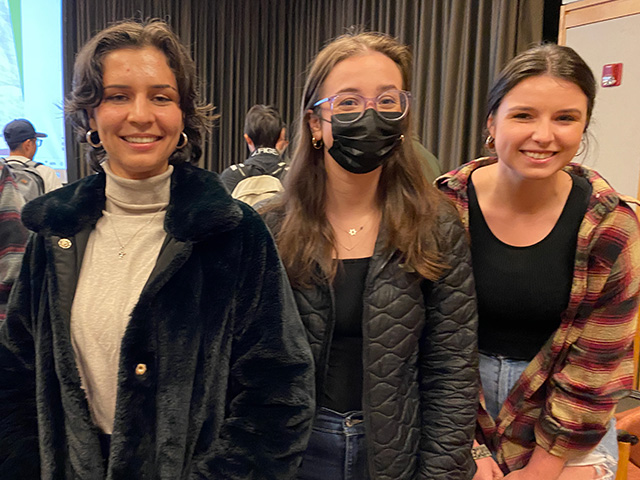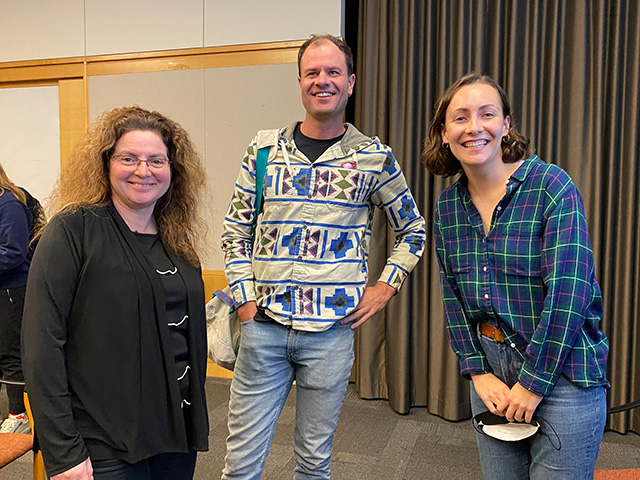
Grad school workshop aims to expand applicant pool
No. 1 message: You can do this!
Quick Summary
- Panelists offer tips and resources for graduate school applications
- Not quite ready for grad school? Here are some alternatives
Students learned the value of self-reflection, bold thinking, perseverance and forming relationships in a recent workshop encouraging them to apply to graduate school.
"Science needs you!" was the most important message students heard. But how to get there?
The workshop, “Navigating Through Applications to Graduate School,” was a part of the department’s efforts to inspire and support students who might be interested in advancing their studies beyond a bachelor’s degree. It’s part of larger efforts to expand access to graduate studies, moving toward a more inclusive and intellectually vibrant community of researchers, both in the Department of Plant Sciences and in the broader scientific realm.

“I organized this workshop on behalf of the department’s Diversity, Equity and Inclusion working group on teaching and mentoring,” said professor Georgia Drakakaki. “The aim was to expose more students to the process of applying to graduate school and hear from experts that have been involved in the selection process. Many students, particularly from less privileged backgrounds, are not familiar with the process and the different supporting resourses available.”
Graduate student Alyssa Phillips shared the panel with faculty members Astrid Volder, a professor, and Christine Diepenbrock and Troy Magney, both assistant professors. They shared their experiences as applicants, mentors and selection committee members to tell stories, offer advice and field questions.

Key points covered
More take-aways from the workshop:
- You DON’T necessarily need stellar grades to get into grad school. Don’t be intimidated. Science needs you!
- Think about what you really want to do. Try to think specifically, but it’s OK if you’re not completely sure!
- Get to know your professors and lab instructors. They potentially could offer advice, read your application essay and other materials and give constructive feedback, and write letters of recommendation.
- Read up on programs in your area of interest. Do your homework to learn about the principal investigators, their specialties and labs. Then, send them an email expressing enthusiasm for their research program and describing, briefly, how you could contribute. When you apply to that school, you likely will need to specify which PIs you want to work with, so developing a relationship with them ahead of the application process will make you a stronger candidate.
- As you craft your application essay, include how your experiences and research ideas would align with and contribute to the lab you’re interested in.
At UC Davis, graduate studies are conducted within a framework called “graduate groups,” in which students enjoy an interdisciplinary, interdepartmental approach to their field. Each graduate group has its own requirements and offers resources. Find out which graduate group would suit you and look at its webpage for more information. For example, the population biology graduate group has information here.
Alternative paths to grad studies
While students often apply to grad school straight out of undergraduate programs, that’s not the only path to advanced studies. There are many reasons why students might want to delay grad school application, and what they do in the meantime can help them prepare and become stronger candidates.
Some possibilities:
- Junior specialist positions: A person in this position works in a lab assisting in others’ research. It offers experience and a salary; it usually requires a bachelor’s degree. Jobs and baccalaureate fellowships at UC Davis can be found on Handshake and other job-posting platforms.
- PREP@UC Davis: This program combines a junior specialist position in research with professional development through seminars, workshops, mentoring and other support. It’s specifically designed to prepare students from less-privileged backgrounds.
- Baccalaureate fellowships: Sometimes funding is available to support research after graduating with a bachelor’s degree. Programs vary, so ask your mentors what might be available. These may also be found on job-posting platforms.
- More resources are here for people interested in grad school, but not quite ready to apply.
“I feel that the students left the room with a better picture and clear steps to follow,” Drakakaki said. Response among those attending was so positive, the committee is considering making the workshop an annual event, she added.
Media Resources
- Trina Kleist, tkleist@ucdavis.edu, (530) 601-6846
